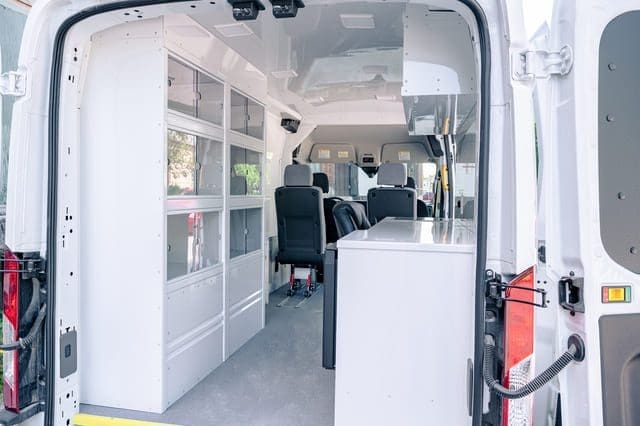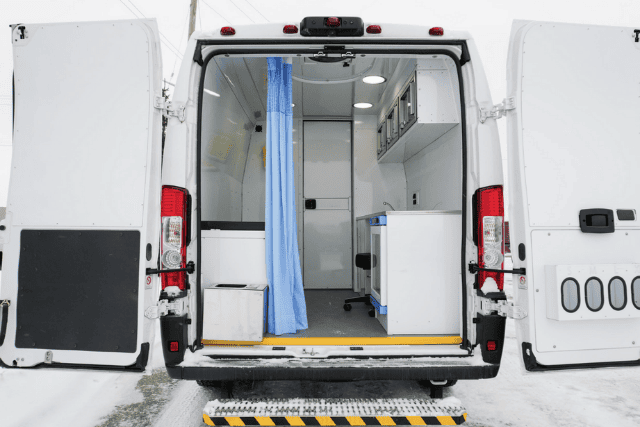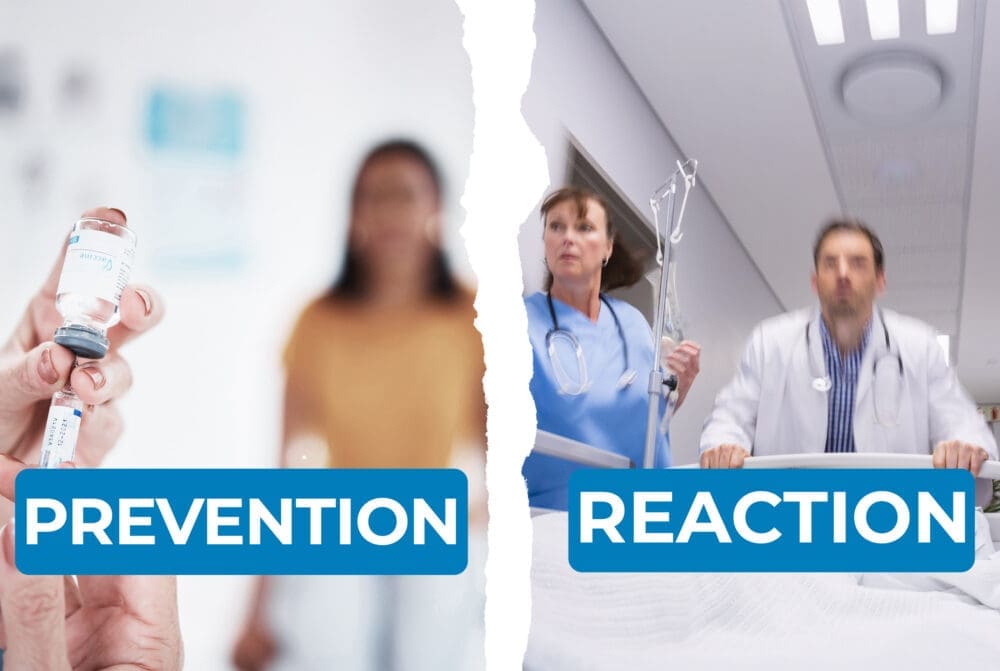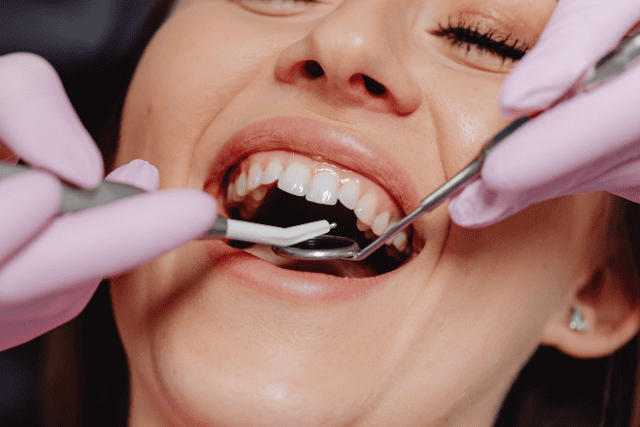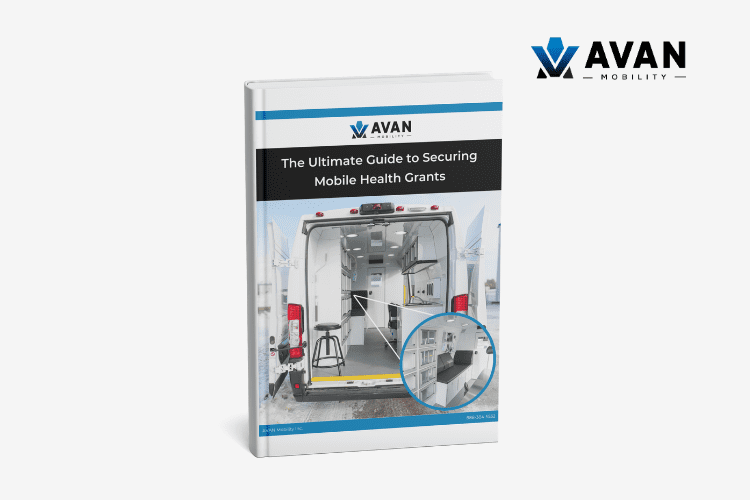Over 20% of adults in the U.S. deal with the daily challenges of living with a mental illness. This issue also extends to 1 in 5 young adults experiencing similar concerns. Around 4% of adults grapple with severe mental illnesses, like depression, schizophrenia, or bipolar disorder. These mental health problems reveal the dire need for more mobile medical health clinics.
Many individuals hesitate to get help for mental health because they fear judgment or the stigma attached to their concerns. Some also doubt that treatment is effective. These are just a few of the barriers to mental healthcare that people face.
Our team at AVAN Mobility has been working hard over the past decade to manufacture mobile medical vehicles to address healthcare barriers like these. Everyone deserves healthcare, no matter who they are or where they’re from. If your organization is looking to start up a mobile mental health clinic, we have just the vehicle for you.
In this article, you’ll learn what a mobile mental health clinic is. You’ll also learn about the Mobile Outreach Van and Mobile Counseling Van that you can use to provide mobile mental health services around the U.S.
What are mobile mental health clinics, and what do they do?
Before diving into mobile mental health clinics, let’s talk about what mobile healthcare units are. Mobile healthcare units are vehicles that are equipped to provide basic healthcare services to people around the country who have trouble making it to a regular clinic or hospital.
They help remove transportation barriers, location barriers, or mobility barriers that prevent people from getting the care they need. While mobile healthcare units can treat physical issues, they can also treat mental health issues.
Mobile mental health clinics are like moving vehicles for support and healing. Instead of staying in one spot, these clinics travel to different places, including cities, towns, and remote regions. They make sure everyone across America can get the mental health help they need.
Trained mental health professionals work in these clinics and offer counseling, therapy, and support.
Who gets help from mobile mental health clinics?
These clinics aim to help people who might otherwise find it hard to get mental health care. Let’s see who benefits:
People in rural areas
Challenge: Nearly 7 million people living in remote areas have a mental illness. Unfortunately, there usually aren’t many mental health services in rural places.
Solution: Mobile mental health clinics go to these remote areas so everyone can get help, no matter where they live.
Students at schools and colleges
Challenge: Students often deal with stress and mental health issues and don’t have the time or finances to seek help.
Solution: Mobile mental health clinics can go to schools with the goal of creating a safe space for students to talk about their feelings.
Areas affected by disasters
Challenge: Natural disasters are stressful enough to wreak havoc on anyone’s mental health. People are often uprooted from their homes and might see images that they never should’ve seen. This can lead to insomnia, anxiety, depression, and even post-traumatic stress.
Solution: People who have just experienced a natural disaster don’t have to worry about driving to a mental health clinic for help. Mobile clinics can go directly to them and help with mental health support during these difficult moments.
People who can’t move around easily
Challenge: Nearly 5% of people between 21 and 64 have some sort of mobility issue. This makes it tough for them to get mental health help.
Solution: People with mobility issues don’t need to worry about leaving their neighborhood. Mobile mental health clinics come to them to support them.
Stigmatized individuals
Challenge: There’s often a blanket of stigma in some cultures for those facing mental health concerns.
Solution: Mobile mental health clinics offer a private and confidential way for people to get support. They don’t have to deal with crowded clinics and busy waiting areas.
Vulnerable populations
Challenge: Vulnerable populations include the following groups of people:
- Low-income
- Homeless
- Disabled
- Minorities
- Immigrants
- Seniors
These groups of people find it more difficult to access essential services.
Solution: Mobile mental health clinics can visit these people right where they are without being seen in a negative light due to the privacy of these clinics.
Mobile mental health clinics are vehicles of support that don’t exclude anyone from getting the help they need. But that’s not all. Stay tuned for the next section where we’ll take a closer look into the world of Mobile Outreach Vans and how your organization can use one of these vans to provide mental health support around the U.S.
What’s the Mobile Outreach Van, and how can your organization use it?
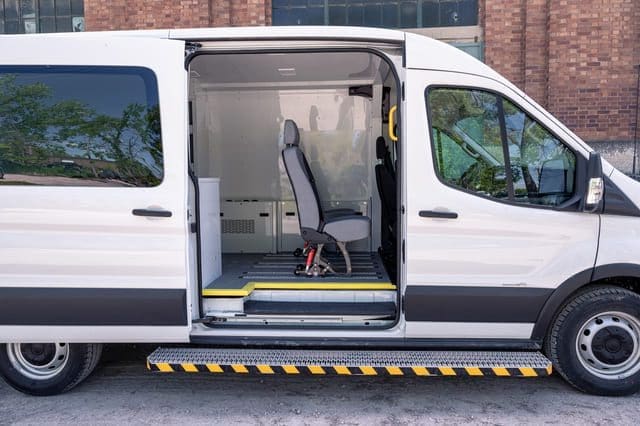
The Mobile Outreach Van is an innovative solution you can use to bring essential mental health services directly to communities. These vans can reach even remote areas of the U.S., ensuring mental health services are available in places that may not have easy access. With the Trail Package Upgrade, they can even make it to northern states of the U.S. where remote road conditions get treacherous.
Here are a few ways how your organization can use these vans:
Mental health support: With these vans, your organization can prioritize providing mental health support in a way that respects your patients’ dignity. Trained professionals in the van can offer counseling services, making mental health support convenient and available when your patients need it the most.
Community workshops: Your organization can also set up workshops inside the van, creating a safe space to talk about mental health, share experiences, and help your patients learn ways to cope.
Information hub: The Mobile Outreach Van is a place where your patients can find resources and guidance to promote mental well-being. When you share information, they can become proactive about their mental health and ensure it stays positive.
What features does the Mobile Outreach Van have?
The Mobile Outreach Van has a ton of features that make it stand out as the premier option to use as a mobile mental health clinic. Let’s take a closer look at each feature and how it’s beneficial for mental health services.
| Feature | How it benefits mental health services |
| Floor-to-ceiling storage cabinets | Easy access to mental health resources and materials, maintaining an organized space for therapists to utilize during sessions. |
| Mobile office desk space | Provides a dedicated area for therapists to conduct paperwork, consultations, and administrative tasks in a private and mobile setting. |
| Sink and fridge | Ensures the availability of refreshments and a place for practitioners to wash up, contributing to a comfortable and welcoming environment. |
| Overhead storage | Additional storage for equipment, allowing therapists to carry essential materials to facilitate various mental health services. |
| Removable passenger seats | Customizable interior layout for flexibility in creating a suitable environment for one-on-one counseling or group sessions. |
| Power supply and conventional outlets | Enables the use of electronic devices and equipment, supporting therapists in delivering technologically assisted mental health services. |
| Rear heat & air conditioning | Maintains a comfortable temperature within the van, creating an ideal atmosphere for clients and therapists during sessions. |
| Clean, comfortable environment | This is a priority for mental health services. It ensures a calming and hygienic space that promotes a positive experience for individuals seeking support. |
| Secured rolling chair | Provides a secure seating option for clients during sessions. It ensures their safety and comfort while maintaining a mobile and adaptable space. |
| Equipment/records storage | Dedicated space for storing any equipment and client records. It promotes efficiency and organization in delivering mental health services. |
| Bright LED interior lighting | Well-lit surroundings contribute to a positive atmosphere. Bright lighting enhances visibility and creates a welcoming environment for both clients and therapists. |
| 12V plugs | Provides alternative power sources for specific equipment, ensuring continuous functionality and adaptability in various scenarios. |
| USB ports | Allows for easy charging of devices such as tablets or smartphones, allowing for the use of digital tools and resources while providing mental health services. |
What’s the Mobile Counseling Van?
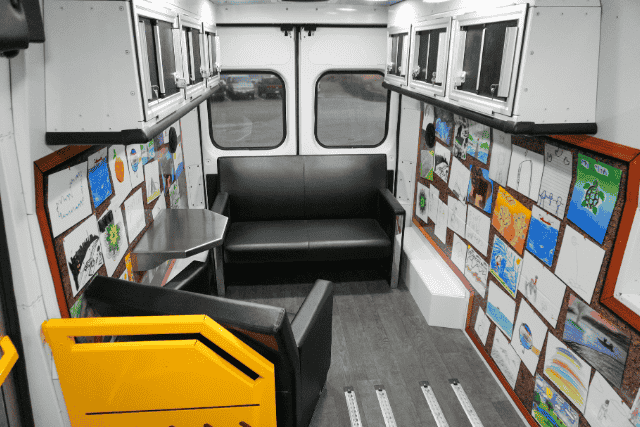
When it comes to mental health support, having a safe and comfortable space can make all the difference. The Mobile Counseling Van is designed to feel like a cozy living room on wheels, helping organizations provide therapy and counseling sessions right where people need them most.
Imagine stepping into a warm, inviting space with couches, a work table for notes or coffee, and natural light pouring in from a skylight. This is is a private, peaceful place where people can open up and get the help they need.
With the Mobile Counseling Van, you can:
- Host one-on-one or group therapy sessions in a comfortable, private space.
- Bring mental health services to underserved communities that lack easy access to care.
- Offer crisis intervention and on-the-go counseling during emergencies or natural disasters.
- Provide support at community events, schools, and workplaces where mental health services are needed.
- Conduct telehealth appointments with built-in WiFi, allowing for remote counseling sessions.
What features does the Mobile Counseling Van have?
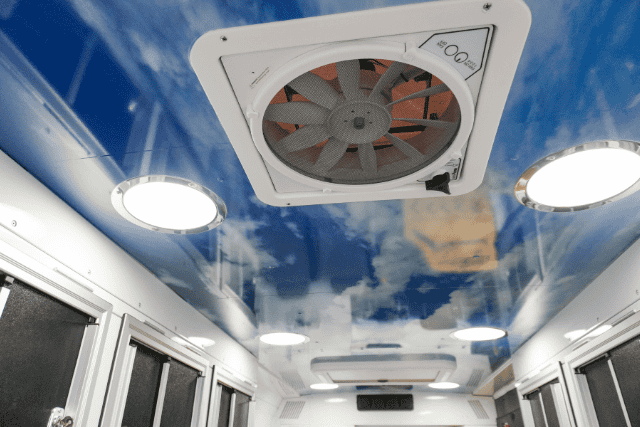
The Mobile Counseling Van is highly customizable. The table below lists some of its features.
| Feature | How it benefits mental health services |
| Living room feel | Creates a warm, inviting space that helps clients feel at ease. |
| Work table | Provides a space for counselors to take notes or place coffee cups. |
| Optional ventilation system | Ensures fresh air circulation for a more comfortable experience. |
| Lots of natural light | Skylight and side entry door bring in sunlight, creating a calming atmosphere. |
| WiFi connectivity | Supports virtual sessions, digital note-taking, and online resources. |
| Storage cabinets | Keeps therapy materials, paperwork, and personal items organized. |
| Interior and exterior decals | Helps identify the unit as a counseling space, making it welcoming and professional. |
| Removable seats | Allows for flexible seating arrangements to fit different therapy needs. |
| Wood grain flooring | Adds a warm, home-like touch to the space. |
| Sound and temperature insulation | Provides privacy and comfort, keeping sessions confidential and cozy. |
Learn more about mobile mental health clinics
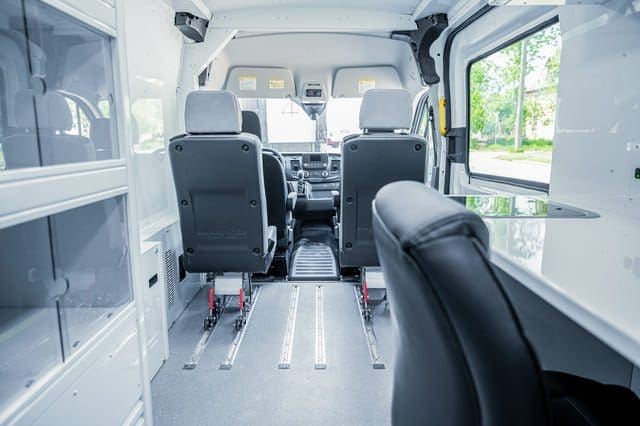
You came across this article looking for more insight into mobile mental health clinics. By now, you have a better understanding of what they are and who they help. You also learned about how your organization can use the Mobile Outreach Van for delivering mental health services.
The nice thing about the Mobile Outreach Van that we manufacture at AVAN Mobility is that your organization can use it for so many different purposes. Beyond just using it as a mobile mental health clinic, you can help people dealing with homelessness, addictions, and substance abuse. You can also use it to provide referral services.
From here, you should read our article on the top 5 benefits of mobile therapy. This article will give you a deeper look at some of the actual benefits of mobile therapy.
You should also check our article on the top 5 areas to deploy a Mobile Outreach Van in the U.S. It’ll give you some insight as to what location of the country might be the most suitable for operations.
Lastly, if your organization is looking for an alternative option that’s geared primarily toward counseling, check out our article on the Mobile Counselling Van.
